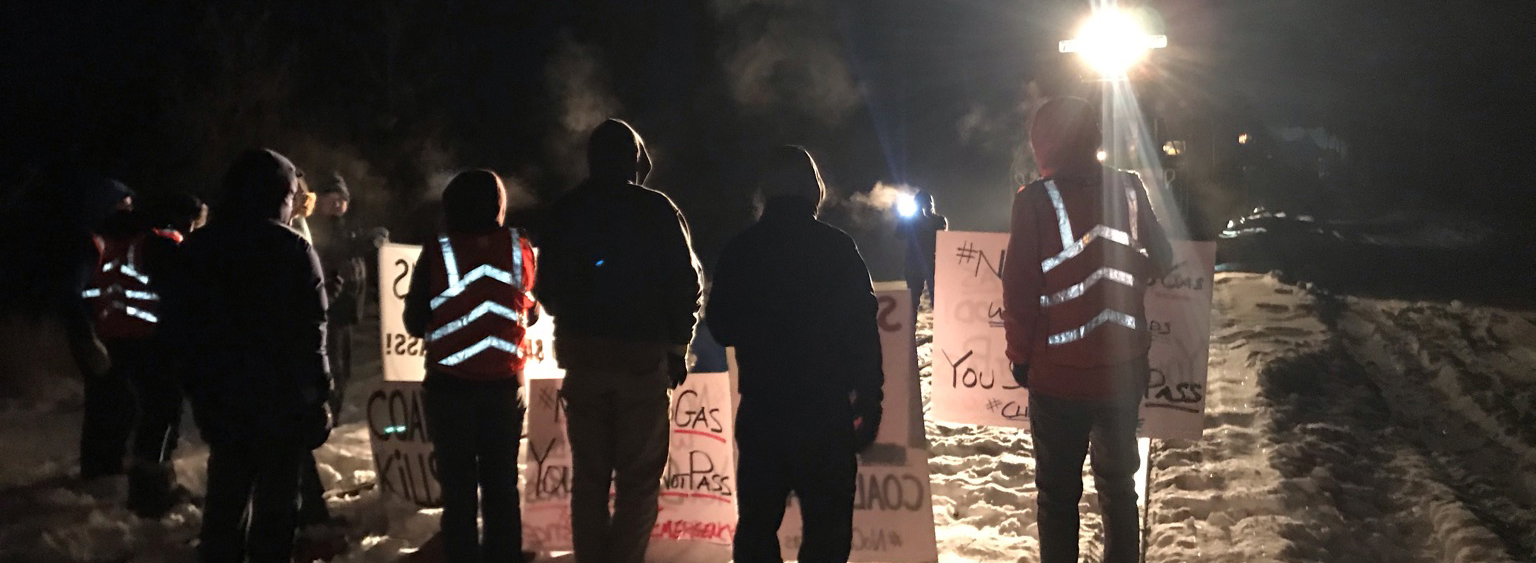Dear Friends,
I am writing to you – some old friends, some new, and some I have yet to meet – out of the blue, but these are increasingly desperate times and the easy graces of protocol must be weighed against the seriousness of the climate crisis and lateness of the hour. I keep receiving upbeat notices about two bills, the “Healthy Climate Bill” (SB1574/HB4068) and “Clean Electricity and Coal Transition Plan” (HB 4036), described as Oregon environmentalists’ and climate activists’ state legislative agenda, which strike me as utterly inadequate in the circumstances.
I have no doubt that you are advancing the strongest possible measures winnable in present political conditions, and doing so meets organizational needs to offer a hopeful public face and demonstrate concrete accomplishments. But haven’t we reached the point where short term winnability should not be our top priority? Isn’t the implicit promise of these bills, that they are significant steps towards addressing climate change, fraudulent? And, because of this, are we not further demoralizing our strongest supporters?
If the story behind these bills was something along the lines of… “Look, we’re in a terrible crisis, about to crash global systems that make civilization possible and we’re going to have to make monumental changes in energy generation, forestry, agriculture, transportation, consumer habits and so on, which are impossible at the moment, so in the meantime, let’s pass what we can with the understanding that this is pitifully inadequate but at least we will be doing something until things get desperate enough to force the nation to take effective action,” I’d still disagree as to the value of the approach, but it wouldn’t be disingenuous.
The entire thrust of our present approach is a sophisticated form of climate denial. We seek to broaden the appeal of averting cataclysm by making it sound less scary, hence the name “Healthy Climate Bill,” and we studiously avoid comparing our proposed policies with global imperatives. In the absence of a target, let alone a target based on the best available climate science, any emission reductions may be presented as a victory.
Environmentalists and climate activists have pursued incrementalist climate solutions for nearly three decades and failed. It’s time to pay attention to that dismal record and to recognize the disproportionate value of approaches, especially climate disobedience, that have worked. A crucial first step ought to be bringing our program and policy objectives into line with climate change realities.
Climate is in free fall and desperate measures are required to stave off collapse. Global emissions in the next five years, at current trajectories, will push the planet past the 1.5C target just set in Paris. The “Healthy Climate Bill” and “Clean Electricity and Coal Transition Plan” are drafted without reference to climate change imperatives and yet presented as solutions. What they really do is legalize catastrophic levels of GHG emissions for decades to come.
The Oregonian recently editorialized…
“The fate of the climate does not hinge upon Oregon’s adoption of cap and trade this year. In fact, the fate of the climate doesn’t hinge upon anything that Oregon does. Oregon in 2013 accounted for only seven tenths of 1 percent of the nation’s total carbon dioxide output, and the U.S. itself accounted for less than 20 percentof the worldwide total.”
The Oregonian opined that if nothing we do matters, then let’s do nothing, which is of course blockheaded, but the crucial point for environmentalists and climate activists is that if nothing we do in Oregon will have significant impact on the global problem, then the value of what we attempt must be measured by its political impact and moral weight.
Bill McKibben recently expressed “blood red anger” over the “sheer, profound, and… unparalleled evil” of ExxonMobil’s campaign to obfuscate climate science and confuse public debate in order to advance the company’s interests. Bill urges us not to treat these revelations cynically, to consider the true harm of the company’s actions.
Aren’t we doing something awfully similar? We are pushing an ineffectual agenda that obfuscates and ignores climate science and confuses the public debate, partly because doing so advances organizational interests.
I think that there is practical alternative – you have an alternative – and if it is seized, Oregon environmentalists and climate activists could, in a small but meaningful way, shift the course of human events towards planetary survivability.
What if we did something along the following lines?
Withdraw current agenda. Seriously. This coalition of Oregon environmental and climate action groups announces that news arriving daily has removed any rationale for the sort of long-term, incremental changes, which aren’t based on nature’s laws, embodied in the “Healthy Climate Bill” and “Clean Electricity and Coal Transition Plan.”
Issue a new agenda. The coalition issues a brief statement of the problem and scope of a solution, including a sketch of state emissions cuts and carbon banking now required, covering fossil fuels and sectors not now included and chooses, say, 10 specific approaches which would, taken together, make a great leap toward meeting that state goal, including forest sequestration mandates, mandatory passivhaus-level construction standards, a ban on all new fossil fuel infrastructure, 100% transition to renewables, 2 year phaseout of coal-based electrify, and other practical, and necessary objectives.
Launch initiative campaign. Choose three to five objectives and immediately launch an initiative campaign to quality for this November ballot. A state ban on all new fossil fuel infrastructure modeled on City of Portland and Multnomah County, full divestment of state fossil fuel investments, a two year phase out of coal-fired electricity with renewables transition mandate and a gold-plated carbon tax, for example.
Invest in game changing work. Within the coalition and as best as possible in conjunction with major funders, reallocate resources toward the initiatives and other synergistic work that reshapes the political playing field. Top of that list should be climate disobedience actions. The experience of the Fennica blockade last summer and Shell No! actions in Seattle illuminates how transformational and cost effective direct action can be. Consider the impact of hundreds of such actions aimed at fossil fuel infrastructure undertaken in concert with a state initiative.
Other effective, synergistic and currently under-valued work includes novel legal approaches like the Atmospheric Trust doctrine lawsuits, Community Rights Initiative, divestment campaigning, Exxon-Mobil accountability, electoral engagement narrowly focused on only the strongest climate-attentive candidates, and opposing the very worst, along the lines of Climate Hawk campaigning.
Call to work. These steps will create an atmosphere of honesty, clarity and purpose and provide a host of accessible opportunities for supporters, many now dispirited and alienated. It does so partly at the expense of majority public, or at least opinion leader support, but our focus on the majority has always been a miscalculation. We must attend first to the core of individuals who are genuinely freaked out about climate change. With such a practical and honest agenda we can call on this core to work hard and contribute heavily and they will.
We will likely lose the tougher initiatives, but compare such an effort to the outcome of our present business-as-usual approach. If we go forward as presumed, we include what amounts to a coal burning preservation act in Oregon state law, assuming HB 4036 passes, and we lose a campaign for ineffective climate policy that doesn’t even attempt to spell out the problem, assuming SB1574/HB4068 fails. Nothing of much consequence will have been achieved and the lost opportunity cost will be high.
Launching an effort such as outlined, however, would almost overnight rewrite the public narrative and reset the terms of the debate, create a vital, honest model of engagement, see almost immediate returns from our investment in what works, gain national and international attention, and potentially spark similar re-imaginings in other states, starting in Washington.
The barriers to such an undertaking are entirely internal; they are the cognitive buffers which keep us from contrasting what is necessary, if risky, to the easy paths before us, and the organizational demands of raising grants, maintaining political access, mass fundraising and so on, which reinforce conformity.
But there is no doubt that we could launch something like this by gathering a few hundred people together for a week. Collectively we have the energy, skills, people and money. We could potentially transform and invigorate US climate action within a month. Neither Exxon-Mobil, nor the timber industry, nor PG&E could stop it.
So why not? The moral imperative for doing so is clear.
I don’t think there are insurmountable practical problems. I can think of some very experienced people who would be willing to do this for room and board alone. I expect that we could draw on the resources of several policy centers, and I bet it wouldn’t be to hard to raise a chunk of money to do the work necessary to launch. Shouldn’t we at least investigate the possibility?
Thanks for considering the idea.
Ken Ward
Climate Disobedience Center
43846 E. Larch Mountain Road
Corbett, OR 97019
Ken Ward is a founder of the Climate Disobedience Center. He served as Executive Director of New Jersey Public Interest Research Group (NJPIRG), President, National Environmental Law Center, Deputy Director, Greenpeace USA and Director, Apeiron Institute for Sustainable Living; cofounded U.S.PIRG, Green Corps, the Fund for Public Interest Research, Toxics Action Center and Public Interest Graphics; and was co-owner and project manager of the Jamaica Plain Green House, winner of the Mayor of Boston’s Green Building Award. He is author of three Grist.org series. A Response to Death of Environmentalism, The Bright Lines Climate Strategy and Coming Home: Chronicling the (re)creation of the JP Green House (with Andree Zalesk). In May, 2013, with Jay O’Hara, Ken blocked a coal shipment at Brayton Point, MA in what was dubbed the Lobster Boat Blockade.








Leave a Reply